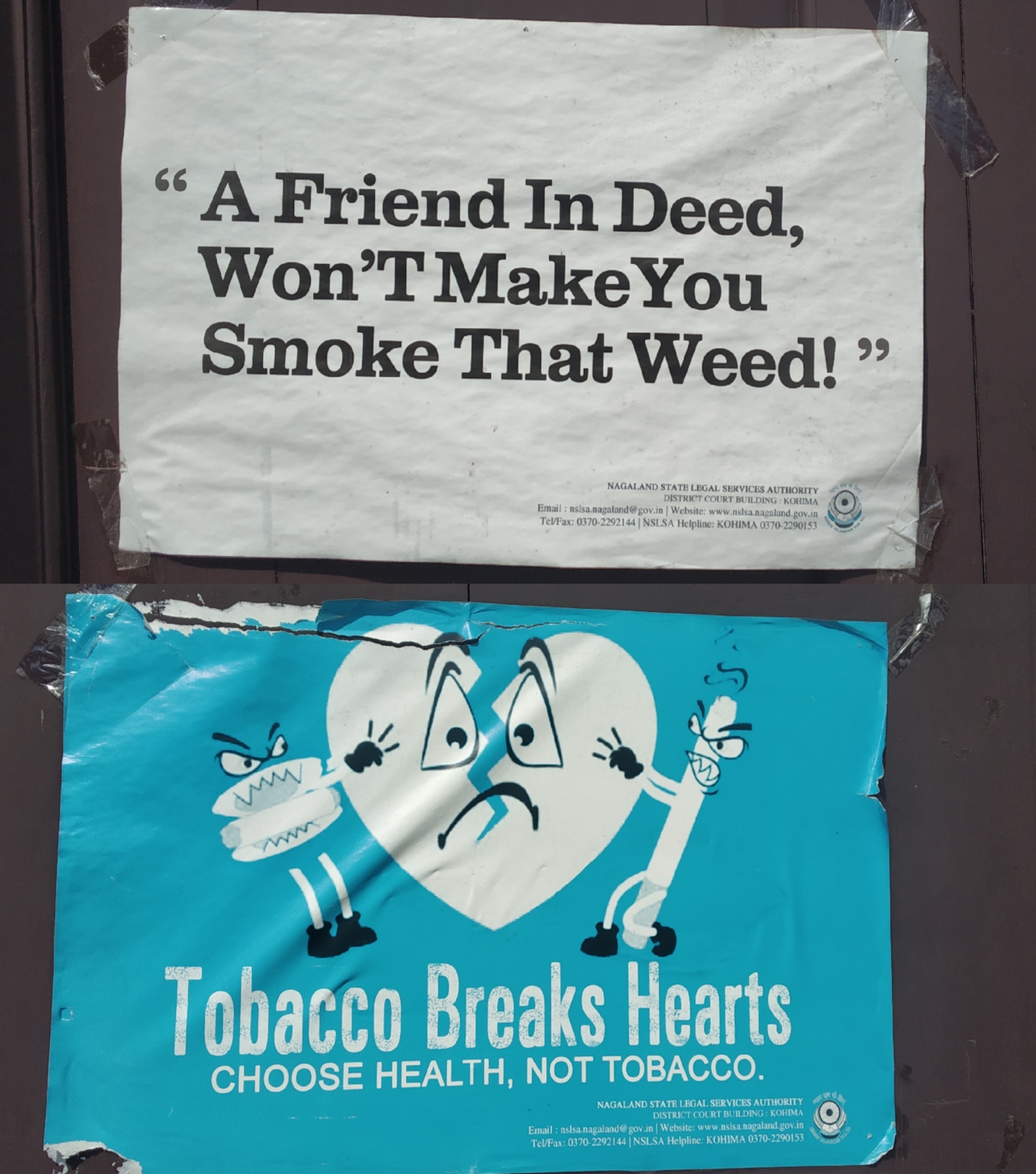Nagaland: Use of cannabis among youngsters on the rise

In this collage photo, anti-tobacco and anti-smoking campaign posters by the Nagaland State Legal Service Authority are seen pasted outside the entrance of a school gate in Kohima. (Morung Photo)
Atono Tsükrü Kense
Kohima | February 5
As one enters a school building in Kohima, there is a poster on the entrance of the gate that reads “a friend in deed won’t make you smoke that weed.”
Ganja also known as cannabis and marijuana is remains one of the most commonly used drugs among adolescents and though there is no specific data on its usage, reportedly the use of marijuana among middle and high school students is on the rise and prevalent in many schools.
According to ‘Magnitude of Substance Use in India 2019,’ Nagaland with 4.7% is listed as second where illegal cannabis products (ganja) are used by a larger proportion of people with sizeable number of people who need help with their cannabis use pattern.
Marijuana is a psychoactive drug from the cannabis plant used for medical or recreational purposes.
Sharing concern on the prevalence of marijuana users among the students, a principal of a government higher secondary school in Kohima on condition of anonymity said, “We know they are using, but we cannot pinpoint the students thinking of the negative reactions it might have upon the students.”
The Principal said the school has this menace going on for the last 3-4 years where the students who use marijuana come to school in normal appearance, however, tend to sleep in the class. It was informed that students as young as those studying in class-VII are using marijuana and majority of the users are in Classes IX-XII.
Earlier, students come to school reeking of alcohol, however in the past few years, the trend of smoking marijuana has become like a fashion, he said.
“We are at lost as to how to deal with them.”
During surprise checking, neatly packed marijuana and even spasmo proxyvon (SP) were found hidden in the boy’s toilet. Some boys were said to have confessed of smoking and inhaling marijuana on a daily basis. Among those users, the addiction of one or two students are said to be beyond counseling who requires medication and rehabilitation.
Curiosity, peer pressure main factor
Curiosity, peer pressure and family problems have been attributed as the key factors for students who use marijuana as told by three counselors on internship from the State Council of Educational Research and Training (SCERT), Nagaland to this particular school during an interaction.
Most of them think using marijuana is not as risky as using other substance, said a counselor, further disclosing that many schools both government and private across the state have been affected by this problem in the recent years.
Students who use marijuana have lower grades, low classroom participation, self esteem, poor attendance and academic performance, she added.
Sharing her experience in the course of counseling the students, she said a student of Class XI, who is addicted to marijuana for 5 years, started the habit due to peer pressure and got himself hooked and addicted.
Another counselor said the youngest user was in Class-VII while another student of Class-IX has been sitting the same class for three years owing to his addiction.
Some hardcore addicts have landed up stealing from parents and siblings, and have withdrawal symptoms like restlessness, itching, body pain etc, they observed.
For some students, medication and rehabilitation have been advised, said the counselors adding, counseling alone is not enough.
Counselor - a must for education institutions
Expressing concerns on the prevalent trend, counselors Mhono Ngullie, Jene and Visakhonuo Vimerha impressed on the crucial need for counselors in the educational institutions today.
“As teachers we expect our students to do well, but we never know the reason why our students are not faring well,” noted Ngullie.
Stating that students undergo lots of problems in their life too – family, relationships, studies etc, she pointed out that basing on her experience they are more “comfortable and can always go to the counselors to talk about their problems.”
Else, they keep bottling up everything, which will eventually stresses them out and affect them mentally, she added.
The counselors also strongly felt that every educational institutions should set aside a period in a week to ‘psycho educate’ about drug use, alcohol, sex education etc so that students have a better understanding of the positive and negative aspects these issues.
“It is very important for the students and the schools to have counselors in the schools, not only for these issues but for career guidance and other aspects too,” they underscored.
Department must initiate
“As teachers and administrative staff, the students look at us as figures of authority and not someone with whom they can confide. So, even if we want to help them and open up to us, it’s futile and we cannot force them” said the concerned principal.
Agreeing with the counselors that a counselor must be deputed in every government school, he maintained that private schools can somehow afford to employ them however, unless the department takes the initiative, the head of the school or authority cannot make it on their own.
SCERT to intensify counseling courses
Meanwhile, Principal Secretary, School Education Nagaland, Menukhol John when enquired, maintained that the department will definitely look into and agreed on the need to address this issue.
Further queried on deputation of counselors in government schools, he informed that SCERT has started the counselor course in 2018 with 37 trainees and said that there might be a need to intensify the counselor course with the present counselors as trainer of trainers.






